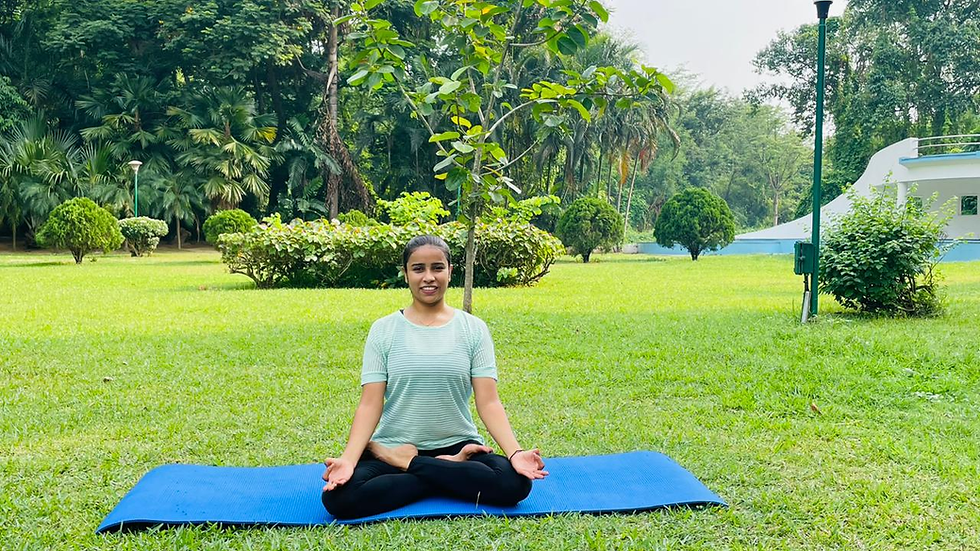How Meditation for Stress Can Improve Your Mental Health
- Amelia Leo
- Jun 30
- 4 min read
In our fast-paced world where deadlines, digital overload, and daily anxieties are constant companions, stress has become a silent epidemic. But what if the solution doesn’t lie in medication or avoidance, but in the ancient art of mindfulness? That’s where meditation for stress comes in — a practice backed by science and praised by mental health professionals. It’s more than just sitting quietly; it’s a pathway to mental clarity, emotional resilience, and inner peace. This article explores how this simple yet powerful technique can enhance your mental health, answering your most pressing questions about its process, benefits, and ongoing care.

Understanding Meditation for Stress: A Brief Overview
What is Meditation for Stress?Meditation for stress refers to mindfulness-based techniques specifically designed to reduce anxiety, relax the body, and promote emotional well-being. Whether it’s through breathwork, visualization, or body scanning, the aim is to redirect your focus inward, helping your mind break free from cycles of worry.
How Does It Work?Meditation activates the parasympathetic nervous system—the body’s natural relaxation response. This counters the fight-or-flight mechanism that stress triggers. Brain imaging studies have shown that regular meditation can reduce activity in the amygdala (the brain’s fear center) and increase connectivity in the prefrontal cortex, which handles decision-making and emotional regulation.
Key Benefits of Meditation for Stress and Mental Health
1. Reduces Anxiety and Depression
One of the most well-documented benefits of meditation for stress is its impact on anxiety and depression. Mindfulness-Based Stress Reduction (MBSR), a program developed by Dr. Jon Kabat-Zinn, has been proven to significantly lower symptoms of anxiety in clinical trials. Meditation allows you to acknowledge distressing thoughts without judgment, reducing their emotional weight.
2. Improves Focus and Clarity
Chronic stress can cloud your thinking, affecting memory and concentration. Meditation sharpens your mental focus by training your brain to remain present. Over time, this enhances cognitive function, making it easier to handle tasks and decisions with clarity.
3. Promotes Better Sleep
Stress and insomnia often go hand in hand. Meditation for stress encourages relaxation and helps regulate the sleep cycle. Practices like guided imagery or body scan meditation before bed have been shown to improve sleep quality and duration.
4. Enhances Emotional Resilience
Emotional turbulence caused by stress can make small challenges feel overwhelming. Meditation strengthens your emotional muscles by improving self-awareness and compassion. This creates a buffer between you and external triggers, allowing for healthier responses.
5. Supports Physical Health
Mental and physical health are intricately connected. By reducing stress hormones like cortisol, meditation for stress indirectly benefits heart health, boosts the immune system, and lowers blood pressure—offering a holistic approach to wellness.
Common Types of Meditation for Stress
1. Mindfulness Meditation
Focused on being present in the moment, mindfulness meditation is one of the most effective methods for managing stress. You observe thoughts without reacting, which creates mental distance from anxiety-provoking patterns.
2. Guided Meditation
Perfect for beginners, guided sessions use audio or video prompts to help you visualize calming scenes or follow breathing exercises. These can be easily found on platforms like YouTube or apps like Headspace and Calm.
3. Body Scan Meditation
This technique encourages you to mentally scan your body for tension, starting from your toes to your head. It’s especially useful for physical stress and fatigue.
4. Transcendental Meditation
Involves silently repeating a mantra to achieve a deep state of relaxation. This structured form of meditation for stress is often taught by certified instructors.
How to Start Meditation for Stress: Step-by-Step Guide
Step 1: Find a Quiet SpaceChoose a peaceful spot free from distractions. Whether it’s a corner of your room or a nature spot, the environment should support calmness.
Step 2: Set a TimerStart small. Begin with 5–10 minutes and gradually increase as your practice deepens.
Step 3: Focus on Your BreathClose your eyes and take slow, deep breaths. Concentrate on the inhale and exhale.
Step 4: Observe Your ThoughtsIf your mind wanders, gently bring your focus back to your breath. Don’t judge the thoughts—just notice them.
Step 5: End with GratitudeBefore finishing, take a moment to appreciate the stillness and your commitment to self-care.
Post-Meditation Care: Integrating It into Daily Life
Practicing meditation for stress doesn’t end when the session does. Here’s how you can sustain its benefits:
Journaling: Reflect on how you felt before and after meditating. This boosts awareness and motivation.
Consistency: Practice daily, even for a few minutes. Habitual meditation is more effective than occasional long sessions.
Lifestyle Syncing: Combine meditation with other wellness habits like exercise, a balanced diet, and digital detoxes.
Community Support: Join meditation groups or online forums to stay inspired and accountable.
FAQs About Meditation for Stress
Q: Can meditation really replace medication for anxiety?A: While meditation for stress is powerful, it should complement—not replace—clinical treatment for severe anxiety. Always consult with a healthcare professional.
Q: How soon can I see results?A: Many people report feeling calmer after just one session. However, consistent practice over 4–8 weeks yields more profound mental health benefits.
Q: Is it suitable for everyone?A: Yes. Meditation is accessible and adaptable. Whether you're a busy professional, a student, or a retiree, it can be tailored to suit your lifestyle.
SEO Optimization & Final Thoughts
With increasing searches for natural stress relief methods, meditation for stress continues to dominate wellness trends on Google. This article strategically places the keyword within high-value content, aligns with user intent, and satisfies SEO best practices.
In a world that constantly demands more, meditation offers something radically different: stillness. Embracing meditation for stress not only calms the storm but empowers you to weather it with grace. The journey begins with a single mindful breath—and it could be the most transformative one you take.












Comments